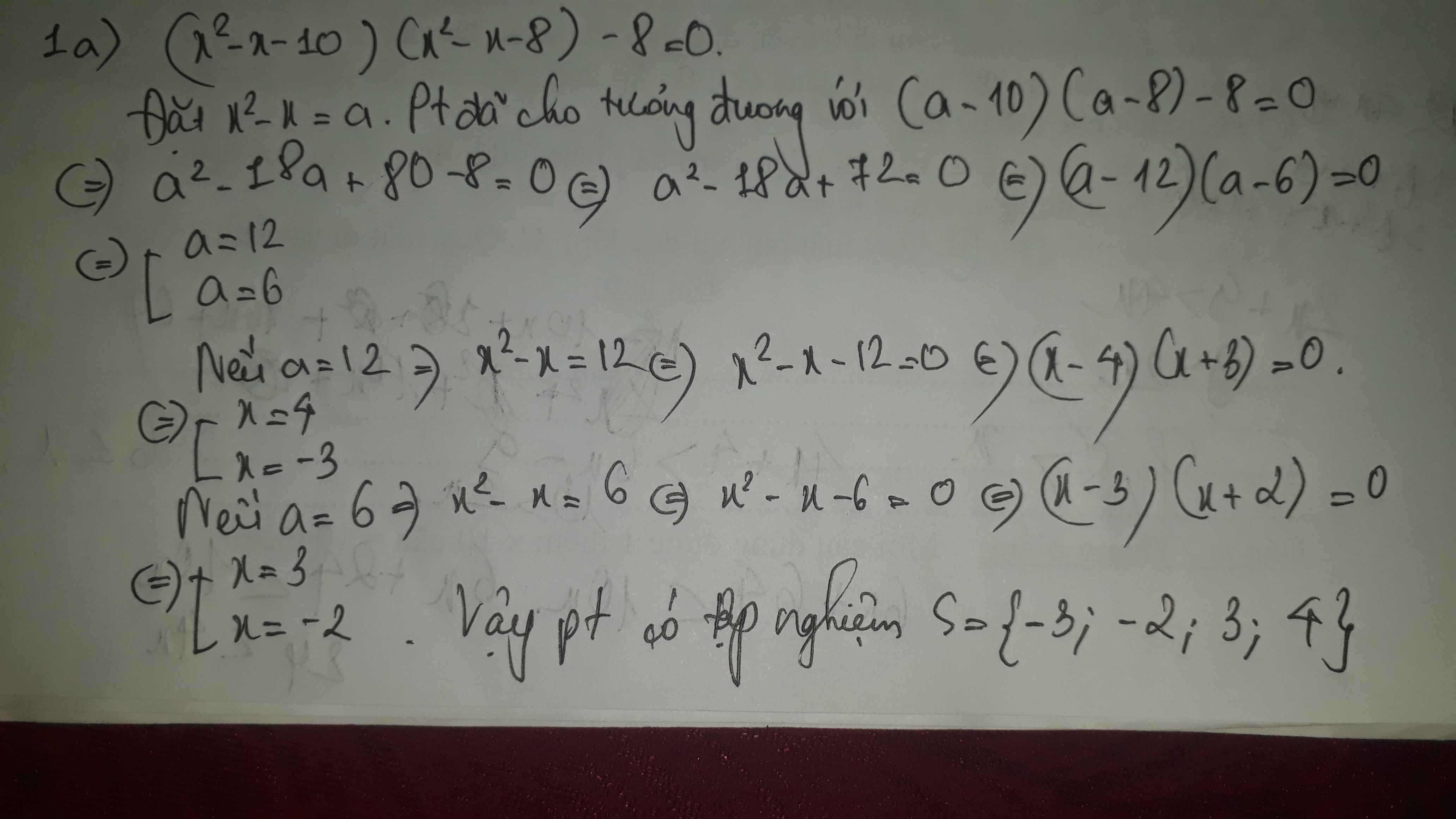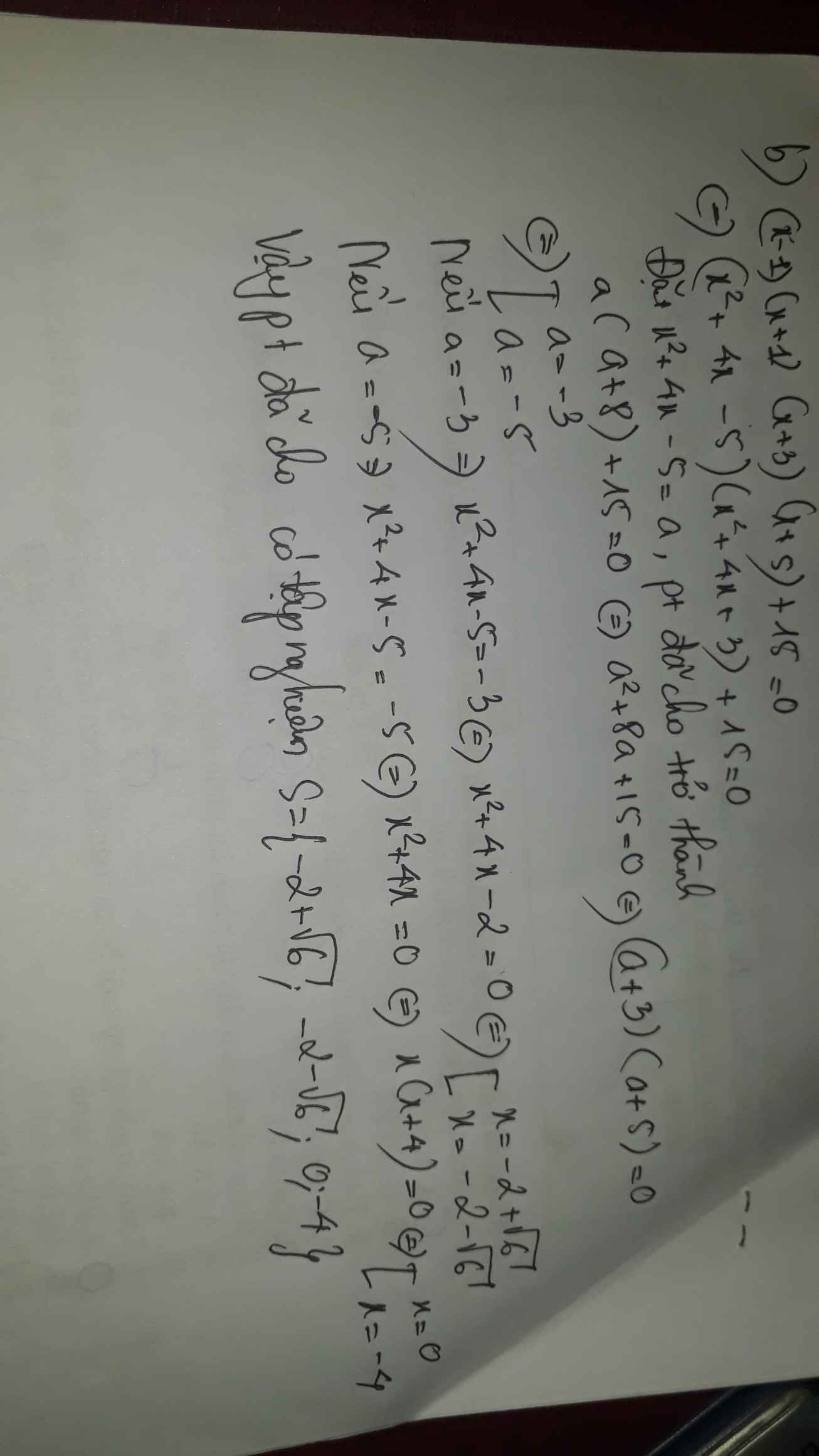bài 2:giải các phương trình sau
a,x^3+x^2+x=-1/3
b,x^3+x^2-x+2=0
Hãy nhập câu hỏi của bạn vào đây, nếu là tài khoản VIP, bạn sẽ được ưu tiên trả lời.


a.
\(\Leftrightarrow3x^3+3x^2+3x=-1\)
\(\Leftrightarrow x^3+3x^2+3x+1=-2x^3\)
\(\Leftrightarrow\left(x+1\right)^3=\left(-\sqrt[3]{2}x\right)^3\)
\(\Leftrightarrow x+1=-\sqrt[3]{2}x\)
\(\Leftrightarrow\left(1+\sqrt[3]{2}\right)x=-1\)
\(\Leftrightarrow x=-\dfrac{1}{1+\sqrt[3]{2}}\)
b.
\(\Leftrightarrow x^3-x^2+x+2x^2-2x+2=0\)
\(\Leftrightarrow x\left(x^2-x+1\right)+2\left(x^2-x+1\right)=0\)
\(\Leftrightarrow\left(x+2\right)\left(x^2-x+1\right)=0\)
\(\Leftrightarrow\left[{}\begin{matrix}x+2=0\Rightarrow x=-2\\x^2-x+1=0\left(vn\right)\end{matrix}\right.\)
b) Ta có: \(x^3+x^2-x+2=0\)
\(\Leftrightarrow x^3+2x^2-x^2-2x+x+2=0\)
\(\Leftrightarrow x^2\left(x+2\right)-x\left(x+2\right)+\left(x+2\right)=0\)
\(\Leftrightarrow x+2=0\)
hay x=-1

a/
\(\left(x-1\right)^2-\left(x+1\right)^2=2x-6\\ x^2-2x+1-\left(x^2+2x+1\right)=2x-6\\ \)
\(\Leftrightarrow x^2-2x+1-x^2-2x-1-2x+6=0\)
\(\Leftrightarrow6-6x=0\)
=> x=1
Giải các phương trình sau
a)\(x^2-2-x+\sqrt{2}=0\)
b) \((1-\sqrt{2})x^2-2(1+\sqrt{2})x+1+3\sqrt{2}=0\)

a: \(x^2-2-x+\sqrt{2}=0\)
=>\(\left(x-\sqrt{2}\right)\left(x+\sqrt{2}\right)-\left(x-\sqrt{2}\right)=0\)
=>\(\left(x-\sqrt{2}\right)\left(x+\sqrt{2}-1\right)=0\)
=>\(\left[{}\begin{matrix}x=\sqrt{2}\\x=-\sqrt{2}+1\end{matrix}\right.\)
b: \(\left(1-\sqrt{2}\right)x^2-2\left(1+\sqrt{2}\right)x+1+3\sqrt{2}=0\)
\(\Delta=\left(-2-2\sqrt{2}\right)^2-4\left(1-\sqrt{2}\right)\left(1+3\sqrt{2}\right)\)
\(=12+8\sqrt{2}+4\left(\sqrt{2}-1\right)\left(3\sqrt{2}+1\right)\)
\(=12+8\sqrt{2}+4\left(6+\sqrt{2}-3\sqrt{2}-1\right)\)
\(=12+8\sqrt{2}+24-8\sqrt{2}-4=32>0\)
Do đó: Phương trình có hai nghiệm phân biệt là:
\(\left\{{}\begin{matrix}x_1=\dfrac{2\left(1+\sqrt{2}\right)-4\sqrt{2}}{2\left(1-\sqrt{2}\right)}=1\\x_2=\dfrac{2\left(1+\sqrt{2}\right)+4\sqrt{2}}{2\left(1-\sqrt{2}\right)}=-7-4\sqrt{2}\end{matrix}\right.\)

a) ĐKXĐ: \(x^2-1\ge0\)
Đặt \(\sqrt{x^2-1}=t\left(t\ge0\right)\)
\(\Rightarrow t=t^2\Rightarrow t\left(t-1\right)=0\Rightarrow\left[{}\begin{matrix}t=0\\t=1\end{matrix}\right.\Rightarrow\left[{}\begin{matrix}\sqrt{x^2-1}=0\\\sqrt{x^2-1}=1\end{matrix}\right.\)
\(\Rightarrow\left[{}\begin{matrix}x=\pm1\\x=\pm\sqrt{2}\end{matrix}\right.\)
b) ĐKXĐ: \(x\ge2\)
Ta có: \(\sqrt{x-2}+\sqrt{x-3}\ge0\) mà \(\sqrt{x-2}+\sqrt{x-3}=-5< 0\Rightarrow\) không có x thỏa
c) \(\sqrt{x^2+4x+4}+\left|x-4\right|=0\)
\(\Rightarrow\left|x+2\right|+\left|x-4\right|=0\) mà \(\left|x+2\right|+\left|x-4\right|\ge0\Rightarrow\left\{{}\begin{matrix}x+2=0\\x-4=0\end{matrix}\right.\)
\(\Rightarrow\) không có x thỏa
Bài 1: Giải các bất phương trình sau
a) x+1/x+3 > 1
b) 2x-1/x-3 ≤ 2
c) x2+2x+2/x2+3 ≥ 1
d) 2x+1/x2+2 ≥ 1

a, \(\dfrac{x+1}{x+3}>1\Leftrightarrow\dfrac{x+1}{x+3}-1>0\Leftrightarrow\dfrac{x+1-x-3}{x+3}>0\)
\(\Rightarrow x+3< 0\)do -2 < 0
\(\Rightarrow x< -3\)Vậy tập nghiệm BFT là S = { x | x < -3 }
b, \(\dfrac{2x-1}{x-3}\le2\Leftrightarrow\dfrac{2x-1}{x-3}-2\le0\Leftrightarrow\dfrac{2x-1-2x+6}{x-3}\le0\)
\(\Rightarrow x-3\le0\)do 5 > 0
\(\Rightarrow x\le3\)Vậy tập nghiệm BFT là S = { x | x \(\le\)3 }
c, \(\dfrac{x^2+2x+2}{x^2+3}\ge1\Leftrightarrow\dfrac{x^2+2x+2}{x^2+3}-1\ge0\)
\(\Leftrightarrow\dfrac{x^2+2x+2-x^2-3}{x^2+3}\ge0\Rightarrow2x-1\ge0\)do x^2 + 3 > 0
\(\Rightarrow x\ge\dfrac{1}{2}\)Vậy tập nghiệm BFT là S = { x | x \(\ge\)1/2 }
mình ko chắc nên mình đăng sau :>
d, \(\dfrac{2x+1}{x^2+2}\ge1\Leftrightarrow\dfrac{2x+1}{x^2+2}-1\ge0\Leftrightarrow\dfrac{2x+1-x^2-2}{x^2+2}\ge0\)
\(\Rightarrow-x^2+2x-1\ge0\Rightarrow-\left(x-1\right)^2\ge0\)vô lí

a)
\(2x-1+5\left(3-x\right)>0\\ 2x-2+15-5x>0\\ -3x+13>0\\ x< \dfrac{13}{3}.\)

\(a)2x-3=4x+6\\ \Rightarrow2x=-9\\ \Rightarrow x=-\dfrac{9}{2}\\ c)x\left(x-1\right)+x\left(x+3\right)=0\\ \Rightarrow x^2-x+x^2+3x=0\\ \Rightarrow2x^2+2x=0\\ \Rightarrow2x\left(x+1\right)=0\\ \Rightarrow\left[{}\begin{matrix}2x=0\\x+1=0\end{matrix}\right.\\ \Rightarrow\left[{}\begin{matrix}x=0\\x=-1\end{matrix}\right.\)

a) (3x + 2)2 - (3x - 2)2 = 5x + 38
<=> 6x.4 = 5x + 38 <=> 19x = 38 <=> x = 2
b) 3(x - 2)2 + 9(x - 1) = 3(x2 + x - 3)
<=> 3x2 - 12x + 12 + 9x - 9 = 3x2 + 3x - 9
<=> -6x = -12 <=> x = 2
c) (x + 3)2 - (x - 3)2 = 6x + 8
<=> 2x.6 = 6x + 8 <=> 6x = 8 <=> x = 4/3
d) (x - 1)3 - x(x + 1)2 = 5x(2 - x) - 11(x + 2)
<=> x3 - 3x2 + 3x - 1 - x3 - 2x2 - x = 10x - 5x2 - 11x - 22
<=> 3x = -21 <=> x = -7
e) (x + 1)(x2 - x + 1) - 2x = x(x - 1)(x + 1)
<=> x3 - 1 - 2x = x3 - x
<=> x = -1


b) Ta có: \(x^3+x^2-x+2=0\)
\(\Leftrightarrow x^3+2x^2-x^2-2x+x+2=0\)
\(\Leftrightarrow x^2\left(x+2\right)-x\left(x+2\right)+\left(x+2\right)=0\)
\(\Leftrightarrow x+2=0\)
hay x=-2